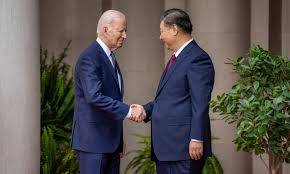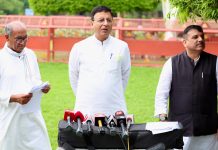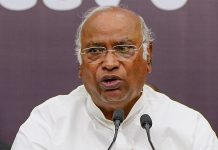India has expressed concerns over the United States and China’s support for Islamist groups in South Asia, viewing it as a strategic challenge. India perceives these dynamics as potential threats to its security and regional stability… by Gopal Misra

New Delhi is justifiably worried that 2025 might be a challenging year for India, particularly as new strategic alliances take shape in its neighbourhood, with Islamists and jihadists receiving tactical support from the US and China. Notably, the recent renewal of ties between the American establishment and jihadist groups—from Syria to Bangladesh—coincided with the New Year massacre in New Orleans. It is unclear whether this was a parting gift from the outgoing US President Joe Biden to his successor, Donald Trump, or a reflection of the quiet but deepening collaboration between Washington and Beijing, with jihadists emerging as a critical element of their geopolitical strategies. Naturally, India has every reason to remain cautious of these evolving alliances as the new US President prepares to take office.
India stands as the only frontline democratic state in Asia facing both covert and overt challenges from military dictatorships and China’s totalitarian Communist regime. For three decades, the US-led West has endorsed the evolution of an aggressive imperialist capitalist system built on a conservative Marxist platform.

India naturally feels threatened by jihadists from the Maldives to Bangladesh, supported by Washington and Beijing. This backing has enabled a hybrid regime to take over Dhaka, harbouring anti-India sentiments and unsettling New Delhi. Against this backdrop, the civilian face of the hybrid regime, Bangladesh’s chief advisor Muhammad Yunus, has called for reinvigorating SAARC, setting alarm bells for India. The regional forum, comprising Bangladesh, Bhutan, India, Maldives, Nepal, Pakistan, Sri Lanka, and Afghanistan, has lost steam due to Chinese demands for inclusion. Pakistan’s hybrid regime of the army and jihadists has endorsed Yunus’s call, prompting India to remain cautious. Meanwhile, India has successfully built bilateral ties with all regional countries except Pakistan.
A section of opinion makers in New Delhi believes that China’s increasing influence may be undermining the strategic objectives of the QUAD, comprising Australia, India, Japan, and the US. Despite repeated assertions that this quadrilateral grouping is not a military alliance, China has opposed it, likely due to the joint military exercises conducted by its members.
Despite Chinese objections, the QUAD has gained traction in recent years. However, with Washington’s recent alignment with jihadist groups, Beijing seems to have been granted a larger role in the fragile economies of the region. During the latter half of 2024, the Biden administration appeared to make significant concessions to China in critical areas such as trade and strategic affairs. It is difficult to discern why Biden conducted himself as one of the most enigmatic US presidents in recent history.
US renews covert links with jihadists
Recently, proxies of the American deep state, the CIA, have reactivated a colonial agenda of carving out a Christian state in India’s north-eastern Christian-majority states, including Mizoram, Nagaland, and Meghalaya. Simultaneously, they have strengthened ties with terrorist groups like ISIS and al-Qaeda in West Asia, using Islamists to oust Bangladesh’s democratically elected Prime Minister Sheikh Hasina. Curiously, the American deep state overlooks domestic threats like the New Orleans massacre on January 1. Before the 9/11 attacks, such terrorists, funded by the Pakistani army, were major beneficiaries of US support. Following nearly two decades of conflict, Trump’s decision to withdraw US troops from Afghanistan marked a turning point. Yet, recent months suggest a rekindling of ties between the US and jihadists.
With US backing, ISIS and al-Qaeda have entrenched themselves in Syria, while Biden’s visible rapport with Muhammad Yunus, who collaborated with Islamists to seize power in Dhaka, has further alarmed India. Biden’s tenure ensured only verbal support for India while facilitating China’s deepening influence in South Asia.
In an effort to win India’s confidence, several agreements were signed between New Delhi and Washington. However, most of these, including the proposed production of state-of-the-art weapons and aircraft, have thus far remained at the drawing-board stage and are yet to take off.
It is believed that the Biden administration grew dissatisfied with India following her refusal to join NATO or any military alliance in the South Asian region. India’s absence from the meeting of defence chiefs of the US, Australia, Japan, and the Philippines, held in Hawaii during the first week of May 2024, has also been noted. Could this have been a genuine provocation for the US to align with Beijing in efforts to oust Hasina? It remains to be explained why the US and its Western allies have suddenly started supporting Islamic terrorists from Syria to Bangladesh. Through these groups, they appear to have granted China unrestricted access to South Asia.
New military axis
With Beijing’s recent decision to supply the sixth-generation stealth fighter aircrafts, J-36, to Pakistan and the growing military cooperation between Islamabad and Dacca has naturally caused anxiety in New Delhi. Notably, India has yet to acquire such advanced fighter jets.
India’s security framework must be revamped in light of the emergence of a new Bangladesh, now influenced by Islamists, aligning with China and Pakistan. The new leadership in Dhaka appears ready to forgive the Pakistani army for the unprecedented atrocities committed against Bengali Muslims during the 1971 War of Independence.
Dhaka’s closer defence ties with China and Pakistan have also emboldened some former Bangladesh army personnel to make provocative claims, such as their ability to capture Kolkata, Assam, and Odisha within four days. These developments could potentially delay fresh elections in Bangladesh.
With an anti-India narrative gaining traction, the upcoming visit of Pakistan’s deputy prime minister and foreign minister, Ishaq Dar, to Bangladesh in February 2025, is anticipated to be historic. Supporters of the new regime in Dhaka have already begun branding Sheikh Mujibur Rahman, the father of Bangladesh, as a kafir, with even his statue being defaced.
For the first time in 54 years since its independence in 1971, Bangladesh appears poised to embrace the very people responsible for the genocide of over three million unarmed Muslims and the violation of more than two million young women. Even today, the Pakistani army and sections of the Muslim clergy maintain that had the soldiers from West Pakistan been allowed to procreate on a larger scale, a new generation of Bengali Muslims would not have allied with the kafirs or the “Hindu government” led by Indira Gandhi in 1971.
In this backdrop, it is difficult to predict any spectacular developments in world politics even after January 20, when the second innings of Trump begins.
Decoding Elon Musk’s deference to Beijing
For observers of international politics, US billionaire Elon Musk, known for his ties to President-elect Donald Trump, appears to adopt a ‘soft’ stance towards Beijing. His criticisms of Britain for allegedly resembling the Soviet Union and his denouncement of the French police’s arrest of Telegram head Pavel Durov have been described as ‘selective.’
While Musk positions himself as a ‘free speech absolutist,’ his frequent overtures to the Chinese Communist Party, where such freedoms are suppressed, have drawn attention. Analysts believe Musk’s deference to Beijing stems from his ambitions to maintain Tesla’s position in the global electric vehicle market. However, Chinese EV giant BYD has already overtaken Tesla, posting $28.2 billion in revenues between July and September, compared to Tesla’s $25.2 billion during the same period.












